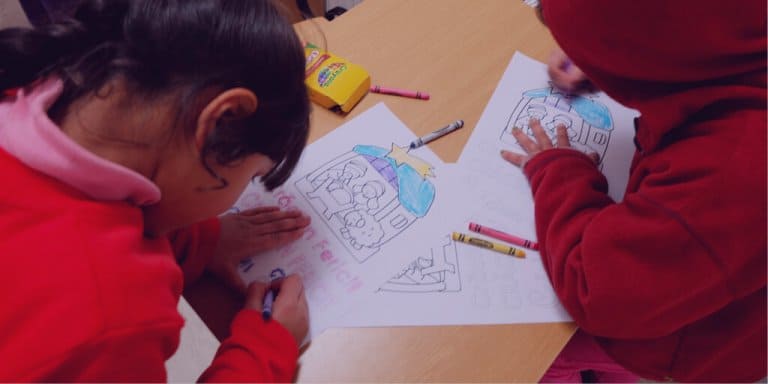Anyone Can Homeschool – It Isn't as Difficult As You Think

If you have considered homeschooling, your initial thought is that it will be difficult. The truth is, homeschooling isn't as difficult as you may think. While most states allow you to homeschool your child as long as you follow the regulations they have set forth, six states in the U.S.A. will not allow you to homeschool unless you have a degree in teaching.
Some of these states are considering changing this law. Unless you live in one of these states, you are able to homeschool without having a degree.
The states that currently require you to have a teaching degree to homeschool your child are:

- Vermont
- Rhode Island
- New York
- Massachusetts
- Pennsylvania
- North Dakota
My Experience
For the last one-and-a-half-years, I have been homeschooling my four children. I do not have a teaching degree, I actually have degrees in Medical Administration, Psychology, and Interior Decorating.
Out of my four children, who are ages 11 years, 9 years, 5 years, and a soon to be 4-year-old, each and every one of them is considered at least a year advanced compared to other children their age. If you purchase a curriculum from a reputable company, you will receive the teaching manuals that come with each subject. This is the main reason that people panic when homeschooling is brought up.
I personally write my own curriculum for each child based on a standard curriculum. The curriculum for my 9-year-old is the most time consuming because he has ADHD, Autism, and Savant Syndrome. He is actually three years above grade level in math, and his main strength is in engineering. He could seriously design a skyscraper better than some people who have multiple doctorate degrees in the field.
As a homeschooling mom of four, I am able to offer valuable words of advice to other parents who want to homeschool. Drawing from personal experience, the best three pieces of advice I can offer parents who are planning to homeschool (or who are struggling to homeschool) are as follows:
- Take your day one subject at a time.
- Plan your lessons and reading material ahead of time.
- Keep yourself, your curriculum, your child's school material, and your records organized.
If you can manage to follow these three simple words of advice, you will be more successful than you ever thought you could be.
Take One Subject at a Time

It does not matter what task you are looking at, if you look at it from a big-picture point of view, you will become overwhelmed. Just think about cleaning your house all at once. It seems like you are drowning, right? Now think about cleaning your house one room at a time. It seems more manageable doesn't it?
For homeschooling, you have four main subjects to tackle each day. These subjects are Math, History, Science, and Language Arts, you have to manage the curriculum for each of these subjects regularly. Let's look at it on a smaller scale. Start your process at least one month before the school year begins so that you have time to properly plan.
Here is how to approach it step-by-step:
- Starting with one curriculum and count how many pages the primary textbook is. Divide the number of pages by 180. This is because the average school year is 180 days, in most states anyway.
- The answer to this division problem will tell you how many pages you will need to cover each day to complete the full curriculum in the 180 days allotted for the school year.
- Take three or four days to set up a complete schedule for this subject. This way, you will not become overwhelmed, and you will have time to spend time with your family and maintain other things you need to do around the house.
- Take an additional two days to collect worksheets, websites, documentaries, free online videos and other materials to supplement their learning.
- Organize your plan in a folder that is dedicated to that subject.Follow these steps to complete the other subject curriculum.
Always Plan Ahead
Each week, take the time to look at the material being covered in the next school week. Are there any additional materials you need to pick up or print out? Do you need to pick up specific items for an experiment that you have planned?
Last week, my Pre-K son needed celery and food coloring to complete an experiment we were going to work on. I couldn't purchase it weeks ahead of time because, well... I have four boys and they are always eating. It would have been consumed long before the experiment was scheduled.
Check to see if your child will require a book for a book report. If you have a book report scheduled, you have a chance to go to the library on Saturday and let them pick out a book.
While it may sound overwhelming, it really only takes me 15 minutes to look through all four of my children's schedules on Friday night to determine what else is needed. Usually, I do this while I sip on a cup of tea after they go to bed.
Stay Organized
Make sure that you maintain your daily planner. You can purchase an academic calendar, which is typically used by teachers to keep track of this.
You should keep accurate records of the following:
- Your child's attendance
- Participation grades
- Worksheet grades
- Experiment grades
- Project grades
- Quiz grades
- Test grades
- and any other graded component that has been completed
Purchase a binder and three whole paper punch so that you can keep all of your child's completed work. Make sure to label the binder with the name of the subject, the academic year, start date, and last day of homeschool.
And finally, make sure that you homeschool for the full 180 days that school is required.







Leave a Reply